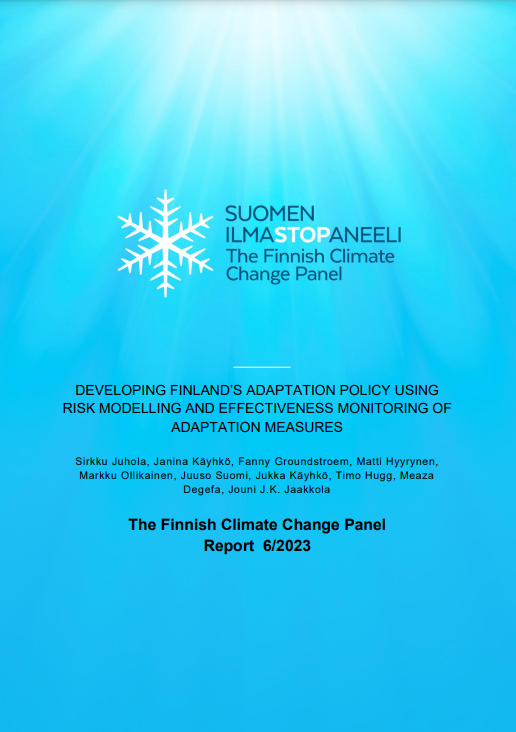Climate change is progressing rapidly, and its impacts are already visible in Finland. Adaptation to climate change and preparedness for the risks must be advanced, despite the uncertainty about the scale of impacts and directions of change in the future. The challenge is to identify specific goals, measures, and policy tools to promote adaptation under conditions of uncertainty. The climate risk framework of the Intergovernmental Panel on Climate Change (IPCC) can provide a systematic basis for modelling the effectiveness and scale of adaptation policy measures.
The aim of this report is to demonstrate how adaptation policy can be based on systematic risk modelling and enhance the monitoring of policy effectiveness by using relevant indicators. The report examines the impacts of a warming climate on the production of public goods, such as health, ecosystems, and information on climate change. The risk framework analysis is utilised to assess adaptation that ensures the health of both humans and ecosystems as temperatures rise and heatwaves become more common.
Regarding human health, the report presents an analysis of how premature deaths caused by heatwaves can be reduced by increasing mechanical cooling in residential buildings and by increasing green areas to mitigate the urban heat island effect. Helsinki, Turku, and Oulu were chosen for analysis to account for regional variations. The results indicate that the coverage of cooling systems in the housing stock should be increased to nearly 100% in Helsinki and Turku, while cooling should be targeted to selected areas in the northernmost case city Oulu. In terms of green areas, geographically targeted greening produces net positive benefits in all cities, with the greatest impact in Helsinki.
Ecosystem health is examined in this report with an example of the deterioration of the ecological state of a river and its prevention. Climate change also raises water temperatures, which weakens the ecological condition of rivers. Rising water temperatures can be mitigated by establishing tree-covered buffer zones along riverbanks, creating new green infrastructure that society supports. The analysis highlights the need to extend adaptation policy to ecological habitats and ecosystem services.
As well as modelling, information needs related to adaptation and indicators suitable for monitoring the effectiveness of adaptation policy are discussed in the report based on findings from scientific literature. The Finnish National Climate Change Adaptation Plan 2030 specifies adaptation goals and measures, as well as responsibilities for them. The Adaptation Plan also identifies methods for monitoring, but indicators of effectiveness have not yet been defined. There are differences in consistency and risk assessments in sectorspecific adaptation strategies.
For the success of national adaptation policy, in addition to implementing the plans, the effectiveness of adaptation efforts must be monitored. To support effectiveness monitoring, identifying indicators for the considered measure selection is necessary. The use of indicators requires that the national adaptation plan uses the risk assessment to identify the risks to which adaptation measures are targeted at, and where possible, their subcomponents. Once the effectiveness of the selected measures has been assessed, indicators can be used to form an overall assessment of the success and challenges of adaptation policy.
The development of an indicator-based monitoring system is currently limited due to knowledge gaps in the effectiveness of adaptation measures. Despite these gaps, adaptation plans must be developed by defining goals at different levels and refining them as knowledge is gained. Long-term monitoring of environmental changes is also necessary to better plan and adapt adaptation policy as climate change progresses.




